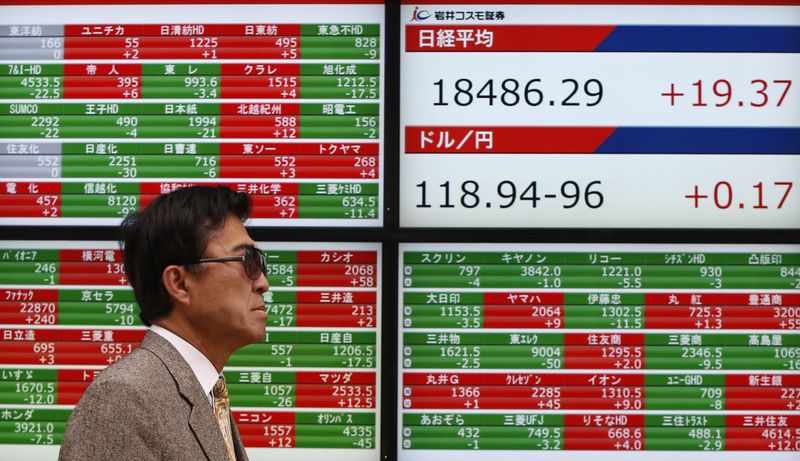This post was originally published on this site
https://i-invdn-com.investing.com/news/LYNXMPEB1O00J_M.jpg
Investing.com– Most Asian stocks fell further on Tuesday as technology majors remained under pressure from new U.S. export curbs and a hawkish Federal Reserve, although Chinese indexes were supported by a couple of strong earnings forecasts.
The Taiwan Weighted Index, which is heavily exposed to Chinese chipmaking stocks, slumped 4% to a near two-year low after the United States announced measures limiting their access to certain U.S.-made technology. The move points to more headwinds for Asian chipmakers and could also potentially worsen ties between the world’s two largest economies.
Hong Kong’s Hang Seng index fell 1.7% with heavyweight technology stocks among the biggest weights. Majors Baidu (HK:9888), Alibaba (NYSE:BABA) Group Holding Ltd (HK:9988), and Tencent Holdings Ltd (HK:0700) slipped between 2.6% and 5%.
Major Chinese semiconductor-linked stocks, including Anji Microelectronics Tech (SS:688019), tumbled over 10% and were the worst performers on the blue-chip index.
But China’s major stock indexes rose on Tuesday, propped up by a strong outlook from COSCO Shipping Holdings Co Ltd (SS:601919) and battery maker Contemporary Amperex Technology Co Ltd (SZ:300750), or CATL. The two stocks added 2.8% and 5.5%, respectively.
The shipping giant forecast an over 40% jump in its profit attributable to shareholders for the nine months to Sept 30, citing improved freight rates. CATL, which supplies batteries to electric carmaker Tesla Inc (NASDAQ:TSLA), said it expects its third-quarter earnings to nearly triple on increasing demand for electric vehicles across the globe.
The two forecasts helped improve sentiment ahead of the third-quarter earnings season, even as China’s economic prospects appeared to be dimming. A resurgence in COVID-19 cases has investors fearing more lockdown measures ahead of the Communist Party’s 20th Congress later this week.
China’s Shanghai Shenzhen CSI 300 index rose 0.5%, while the Shanghai Composite index added 0.4%. Focus this week is on local inflation and trade data for more cues on a potential recovery in the Chinese economy.
Broader Asian stocks marked deep losses. South Korea’s tech-exposed KOSPI fell 2.4% and Japan’s Nikkei 225 index slumped 2.7% in catch-up trade after a holiday on Monday.
Asian markets marked a weak start to the week, which was worsened by hawkish signals from Federal Reserve Vice Chair Lael Brainard on Monday.
Brainard said the central bank has no intentions of a dovish pivot in the near-term, and will only ease its hawkish stance when it is convinced inflation is on the lam.

